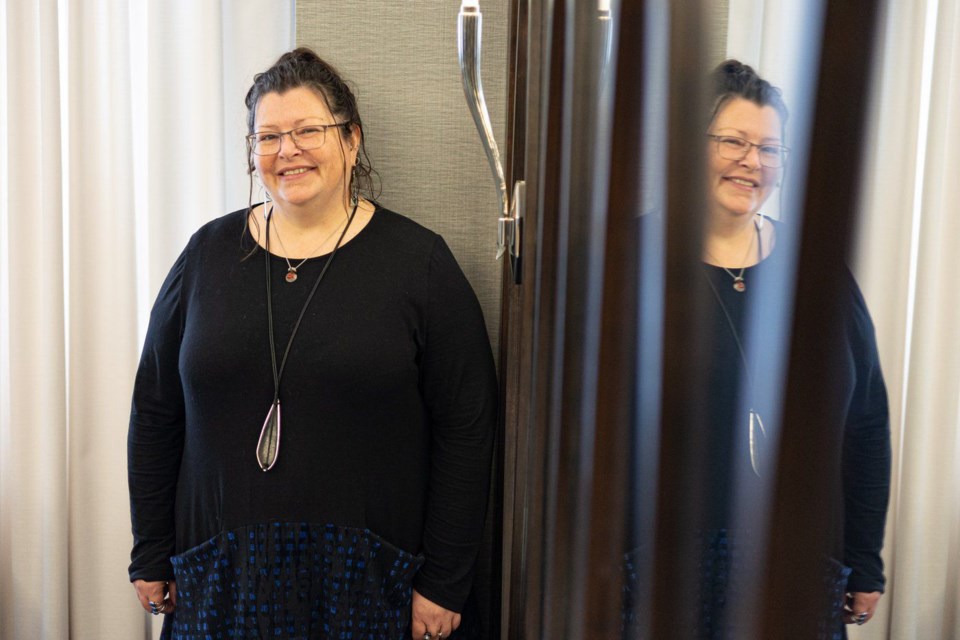SASKATOON — In her role as Canada’s first federal housing advocate, Marie-Josée Houle is travelling across the country, visiting shelters, encampments and supportive housing in major urban centres and the smallest communities.
This week, Houle’s travels have brought her to Saskatoon, where she delivered the keynote ‘fireside chat’ on the second day of the Building Community — Saskatchewan Housing and Homelessness Conference hosted by Métis Nation-Saskatchewan (MN-S).
She said the conference is a chance to hear from different voices, forge collaborations and build relationships with local governments, advocates and people with lived experience of homelessness in Saskatchewan.
“My work looks at systemic issues, but I still need to engage with people,” Houle said. “It’s the best way to get to the heart of issues, and the people here are passionate. They want change, and they are the ones who are able to really get to the heart of the issue, pinpointing the situations people are living and the complexities they are facing.”
Appointed to her role in February 2022, Houle’s mandate is to “promote and protect the right to housing in Canada (and) drive change on key systemic housing issues.”
In her advocacy for the rights of homeless populations, Houle said she is often looking for “a line that decision-makers will hold; that they will not dare cross” when it comes to people’s lives, health and well-being.
“I need to know ... that people will not be allowed to freeze to death, or have forced amputations because they are outside,” she said.
Over the course of her three-year term, she is responsible for making recommendations to improve Canada’s housing laws, policies and programs, and making public reports to the federal minister responsible for housing.
Houle said she is already planning a return trip to Saskatchewan in the summer, where she hopes to spend time in communities throughout the province and elevate their housing concerns to the federal level.
“Beyond just affordability, housing needs to be appropriate,” she said. “It needs to be habitable, close to resources and culturally relevant. It needs to have safe drinking water.
“So I look forward to coming back to Saskatchewan and continuing to work with the people that I’ve met here at this week’s conference, and getting their insights into some of the areas I should go visit.”
Though she was appointed to a federal position, Houle said she advocates for housing justice at all levels of government and is particularly focused on highlighting the most affected groups.
“Even though, with my mandate, I have federal in my title ... a lot of our reports are also targeted at other governments,” she said. “All governments need to work together in order to make it a priority to address the issues of housing precarity and homelessness that so disproportionately affect people who are Indigenous.
“There are a lot of really important relationships that need to be built, but in a very different way than they have in the past.”
During her fireside chat Wednesday, Houle spoke about the types of housing resources she has seen in Canadian communities — and where many of those resources and support systems fall short, particularly for the people who need them most.
Many shelters and supportive living arrangements are time-limited, giving people only a few weeks or months to get their feet under them. That time constraint can be especially difficult for people who are also living with addiction or other health conditions, or who have been without stable housing for a long time.
“And some people will always need supports — and we should be OK with that,” Houle said. “It should not come with all these strings attached or these expectations.”
Houle also spoke about the conditions she has seen and heard about in homeless encampments.
“A lot of reasons why people in encampments choose that over shelters is because of exclusion, or because of the rules — some shelters don’t allow pets, or they split up couples, or people who use drugs aren’t allowed to use them at the time when they need them,” Houle said.
“So if encampments are what we have as a stopgap measure for now, until we have the appropriate type of housing supply ... then having access to clean drinking water, to showers and to a place to wash your clothes needs to be in place to serve people.”
During the rest of her term as housing advocate, Houle said she plans to continue gathering stories and data on housing and homelessness throughout the country, and sharing that with the government and citizens.
“Coming up in the future, we’re going to continue to normalize the language of the human right to housing,” she said. “We’re going to educate the public, raise awareness around the human right to housing, and make sure that people reach for the level of justice that they deserve.”
But as she enters the second year of her three-year term, Houle said she is well aware of the scope of the challenges.
“It’s a big country,” she said. “We won’t get this licked in three years, I can tell you that.”
To leave or read comments, go to SASKTODAY.ca's Facebook page.




